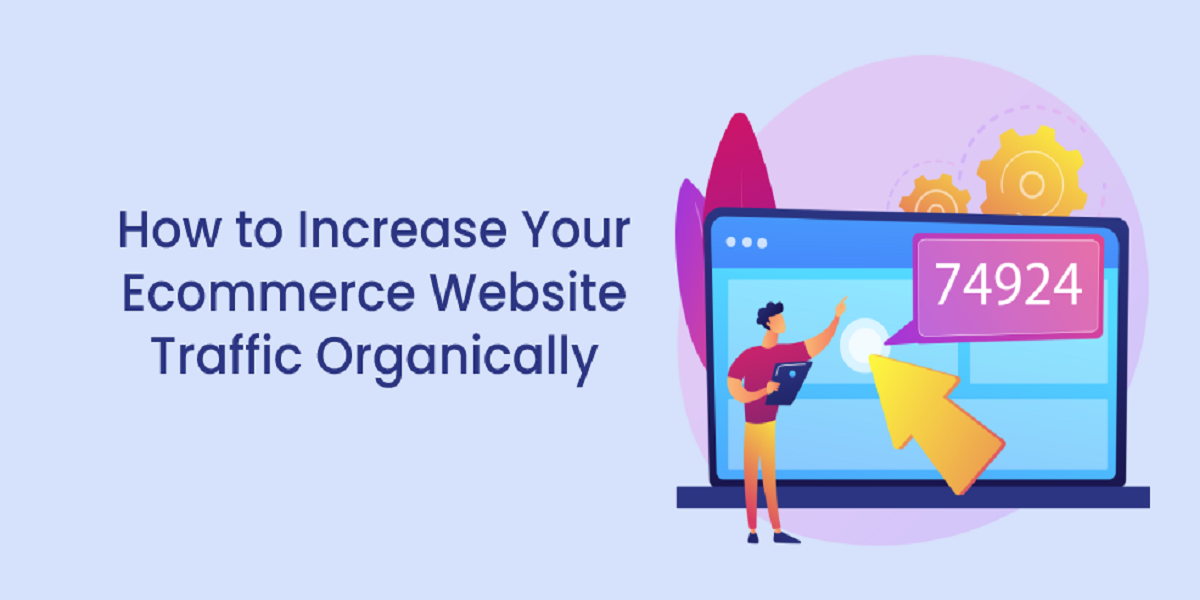
How To Increase Your Ecommerce Website Traffic Organically
- By Linda Hartley
- 25-10-2021
- E-commerce
Despite having a phenomenal product and a well-functional e-commerce design, businesses still need to gain traffic. The components that impact the organic traffic of e-commerce websites include SEO rankings, tracking and measurement of metrics, and effective strategies.
It is not an easy task to grow organic traffic by being valuable. Various aspects need to be considered including the niche of your e-commerce website, your industry, and the overall performance of the team. This article covers the best SEO organic strategies that help in gaining traffic and getting the highest level of traction.
Components of generating traffic for e-commerce website
Every component of SEO states whether the website is highly related to on-site SEO or off-site SEO. A clear difference helps businesses make the right decisions. Learn about the elements, their effect on SEO rankings, and best practices to follow.
- The headings and titles of pages
The titles and headings of e-commerce website pages should be well organized and structured. A well-written website content helps in generating traffic by crawling pages and indexing the layout of your site. The main titles and headers of the pages are the basic components that outline the coverage of the topic. Users and search engine optimization engines determine what the page is about through titles and headings. Furthermore, these engines make use of indexed headers for recalling your page that is entirely based on the search intent of users.
- URL structure
The URL structure ( main website address ) is one of the most important components for generating SEO. The optimized URL structure seems authentic and legitimate to customers, as they tend to avoid all the characters with inauthentic and strange characters. Moreover, search engine affects the path of domain while ranking your page. So, there is an immense need for E-commerce websites to ensure the URL is labeled according to the contents and topic of your webpage. This helps in ranking the website organically.
- Page load speeds
The performance and speed of the page never come to mind whenever you think of on-page SEO. However, the page loading, its responsiveness, and the ways customers perceive it are the most crucial components of SEO ranking. Always ensure to alleviate the number of images on your website, as they tend to slow down the speed of the website. Keep updating your platform now and then so that you know they are offering good speeds and high performances.
- On-page links
Are you aware of the on-page links and hyperlinks on a website? Well, these links are integrated into the content that is written for an e-commerce website by using anchor text. Always ensure to choose the links cautiously so that you can link your customers with highly valuable resources. It is one of the best ways to create value and build their trust in your website. These links are also used for the determination of validity, relevancy, authenticity, and the authority of your website.
Make a wise decision while choosing the internal and external links.
- Metadata (titles and descriptions)
The on-page SEO is often considered as content and images people see, but a lot of other things tend to go in the background. Meta titles, meta descriptions, and meta tags are the major and crucial components of On-page SEO. These components summarize the structure and layout of your page content for both users and search engines. As a result, it affects the overall ranking results. Whenever a search engine wants to crawl the page of your website, it makes use of Meta titles to comprehend the structure, organization, and layout of your page. It determines whether or not it meets the search intent of users. Since the metadata is invisible to customers, they still help you rank higher in search engine optimization.
- Content
Below a shadow of any doubt, on-page SEO is incomplete without well-written content. The rank of your website depends on images, infographics, copy text, and other associated elements. These elements play an indispensable role in affective the overall ranking of e-commerce websites. There is an immense need for content writers to come up with unique and engaging content to help users know about your website and to bring the rank higher in SERPs.
To consider the target audience while writing content is important, but still, it should be written and optimized by keeping the search engine in mind. Integrate the keywords according to relevant topics, name the images by keeping SEO strategies in mind, and ensure to have a proper keyword density according to the requirements of the content.
- Guest blog posts
Below a shadow of any doubt, guest blog posts are the most important write-ups for off-page SEO. They are featured on the domains of other web pages and then they are linked back to your web pages. Guest blog posts function the same way as backlinks do. They help in increasing the overall authority of the domain by having relevant and premium-quality content linking back. This directs and engages the attention of customers backs to your page. Moreover, gains traction with the target audience. Always ensure to use the best websites for publishing your articles so that potential customers are more likely to convert to your platform.
Wrap up
Below a shadow of any doubt, it has become necessary to generate traffic on e-commerce websites. No matter whatever product/service you are selling online, e-commerce businesses need to grow. But these businesses can never grow with a set-it and forget-it method. To sell them, there is an immense need for you to have a stream of visitors so that your website can nurture and turn users into customers.
There are many ways of generating traffic on e-commerce websites. There are two primary approaches, paid promotions and organic methods. However, to generate traffic through organic methods, e-commerce businesses can consider the aforementioned tactics.
Recent blog
.png)
Top 03 Audio Enhancers to Enhance Your Voice in Minutes
Technology | 18-04-2024.png)
Offshore and Nearshore Mobile App Development: A Guide
Mobile App Development | 17-04-2024.png)




